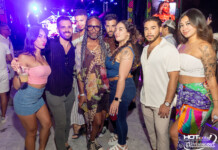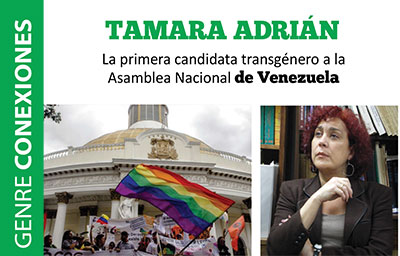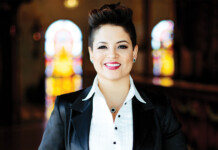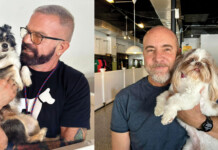
Por: José J. Blanco
Desde hace más de 20 años esta abogada venezolana se ha dedicado al activismo en la lucha de los derechos igualitario de la comunidad LGBT en ese país
El pasado 8 de agosto, Tamara Adrián se convirtió en la primera candidata transgénero en participar por un puesto como diputada en la Asamblea Nacional de Venezuela en las  elecciones que se celebrarán el próximo 6 de diciembre y cuyo cargo tiene una duración de cinco años.
elecciones que se celebrarán el próximo 6 de diciembre y cuyo cargo tiene una duración de cinco años.
La crisis política por la que atraviesa Venezuela en estos momentos ha sido la gran pared con la que el movimiento igualitario ha chocado múltiples veces desde que Hugo Chávez se hizo con el poder en 1998. En incontables campañas, el gobierno Nacional se alzó con la bandera igualitaria para ganar adeptos que luego rechazaba sin ningún miramiento y que, desde la llegada de Nicolás Maduro al poder, prácticamente la discusión de estos derecho ha quedado fuera de agenda alguna dejando prácticamente desprotegida a toda la comunidad LGBT venezolana.
“La posibilidad de presentarme como candidata se dio porque mi partido, Voluntad Popular, –el mismo partido al que pertenece Leopoldo López y quien es preso político del régimen– siempre ha incluido en su línea ideológica la lucha por la comunidad LGBT y esta lucha constituye la divisa fundamental de la organización y esto lo practicamos como una misión de vida” asegura Adrián.
La polarización entre chavistas y opositores han creado fuerte enfrentamientos en el país,  incluso varios candidatos identificados con la comunidad y pertenecientes al PSUVE (Partido Socialista Unido de Venezuela) fueron rechazados por el propio partido. “Una candidatura cómo la mía quita, sin duda alguna, las banderas de la hipocresía que el PSUV ha tenido durante mucho tiempo. La verdad es que se han portado muy mal porque a estos candidatos se les dijo que los iban a apoyar y desafortunadamente no hicieron nada, de hecho ellos realizaron protestas y ni siquiera les respondieron”.
incluso varios candidatos identificados con la comunidad y pertenecientes al PSUVE (Partido Socialista Unido de Venezuela) fueron rechazados por el propio partido. “Una candidatura cómo la mía quita, sin duda alguna, las banderas de la hipocresía que el PSUV ha tenido durante mucho tiempo. La verdad es que se han portado muy mal porque a estos candidatos se les dijo que los iban a apoyar y desafortunadamente no hicieron nada, de hecho ellos realizaron protestas y ni siquiera les respondieron”.
El activismo dentro de la comunidad ha disminuido en los últimos años, Adrián considera que se debe a la politización del movimiento “en el año 2007 en la marcha del Orgullo yo llegué a contar entre 50 y 70 mil personas, si el año pasado hubo cinco mil, fue mucho. Esto se debe a que en 2008 el gobierno nacional comenzó a poner banderas rojas (el color político del chavismo) camiones y caras de Chávez por doquier. La gente comenzó a sentirse que no era representada y ante tantas ‘situaciones’ dejo de interesarse” pese a esto Adrián se muestra optimista. “en esta ocasión, y con relación a mi candidatura, la comunidad a comenzado a unirse de nuevo esto le ha dolido mucho a los oficialistas, por lo poco que tenemos y sabemos –en Venezuela está prohibido hablar de cifras durante los comicios– muchos de estas personas se están viniendo con nosotros”. Quizás la comunidad LGBT sean los primeros en dar el paso para reconciliación en Venezuela
On August 8, Tamara Adrian became the first transgender candidate to run for a position as deputy in the National Assembly of Venezuela in elections to be held on December 6. The post would last five years.
 The political crisis Venezuela is going through right now has put a halt to the equality movement since Hugo Chavez took power in 1998. In countless campaigns, the National government won by touting the equal flag to gain followers then unceremoniously rejected the movement after winning the elections. Since the arrival to power of Nicolas Maduro, the discussion of those rights has virtually disappeared from the political agenda. All of these troubling events have left the entire Venezuelan LGBT community virtually unprotected.
The political crisis Venezuela is going through right now has put a halt to the equality movement since Hugo Chavez took power in 1998. In countless campaigns, the National government won by touting the equal flag to gain followers then unceremoniously rejected the movement after winning the elections. Since the arrival to power of Nicolas Maduro, the discussion of those rights has virtually disappeared from the political agenda. All of these troubling events have left the entire Venezuelan LGBT community virtually unprotected.
“My ability to run for office and declare myself a candidate is possible because my party, Voluntad Popular, which is the same party of Leopoldo López, a Venezuelan political prisoner,  has always included the struggle for LGBT rights as one of its platforms. This struggle is the basic currency of the organization and we hold that our ¨mission of life” ensures Adrian.
has always included the struggle for LGBT rights as one of its platforms. This struggle is the basic currency of the organization and we hold that our ¨mission of life” ensures Adrian.
The polarization between Chavez supporters and opponents has created strong clashes throughout the country, including the ouster of several candidates belonging to PSUVE (Partido Socialista Unido de Venezuela) who identified with the community and were therefore rejected by the party. ¨A candidacy like mine removes itself, without a doubt, from the hypocrisy that the PSUV has long had. The truth is that they have behaved very badly because they publically stated that they would support these candidates but unfortunately they did nothing, in fact they staged protests against them and never answered questions or critizism.”
Activism within the community has decreased in recent years; Adrian figures it is due to the politicization of the movement “in 2007 at the Pride march, I counted between 50 and 70 thousand people, if last year there were five thousand, I´d be overstating. This is because in 2008 the national government began to fly red flags (the political colour of Chavez) everywhere, they put up pictures of Chavez´ face, political propaganda, and trucks with political slogans for the president were all over. People began to feel that they weren’t represented and like in so many ‘other situations’ they just lost interest.” Despite this, Adrian remains optimistic. “This time, and in relation to my candidacy, the community has begun to re-joins the movement, we can’t talks about figures –in Venezuela is forbidden to talk about polls during elections- but we know that all these people are coming with us, even the ones who were rejected from PSUV”. Perhaps the LGBT community are the first to take the step to reconciliation in Venezuela.















